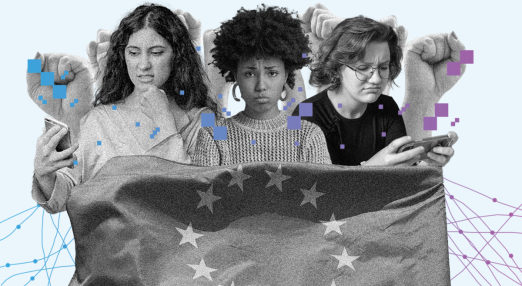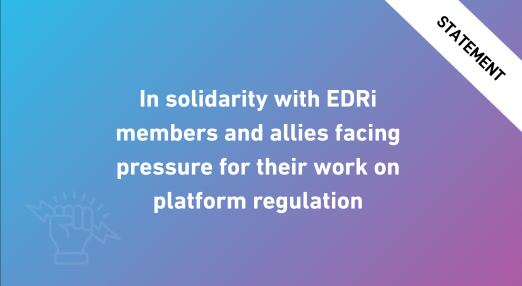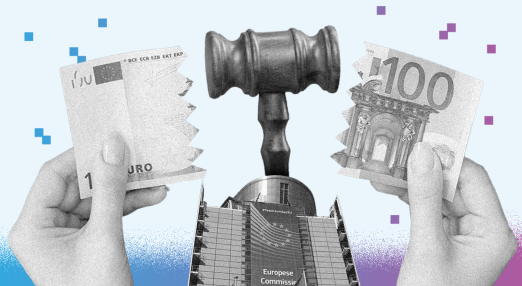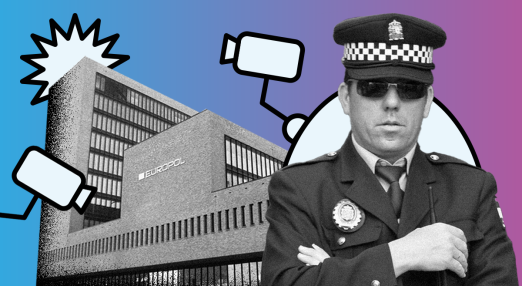Open Letter: We say no to Big Tech mass snooping on our messages!
EDRi and 39 organisations are urging Members of the European Parliament to reject any extension of the the temporary ePrivacy derogration, also known as “Chat Control 1.0”, and to protect the rights that keep us safe from arbitrary snooping in our lives.
Filter resources
-

Open Letter: We say no to Big Tech mass snooping on our messages!
EDRi and 39 organisations are urging Members of the European Parliament to reject any extension of the the temporary ePrivacy derogration, also known as “Chat Control 1.0”, and to protect the rights that keep us safe from arbitrary snooping in our lives.
Read more
-

Reopening GDPR and ePrivacy through the Digital Omnibus: a risky path for EU digital rights
EDRi has assessed the Digital Omnibus proposals affecting the General Data Protection Regulation (GDPR) and the ePrivacy framework. While presented as simplification, the changes amount to deregulation in effect, weakening fundamental rights safeguards, increasing legal uncertainty, and advancing through a process that falls short of democratic lawmaking standards.
Read more
-

Statement of solidarity with EDRi members and allies facing pressure for their work on platform regulation
The EDRi network strongly condemns the pressure of the US Trump administration on EDRi members and allies for our work on online platform regulation.
Read more
-

Open Letter: Civil society concerned about extensive and indiscriminate data retention regime in Switzerland
19 civil society organisations have penned a letter to the Swiss Federal Department of Justice and Police (FDJP) to express serious concerns about their plans to extend the Swiss Data Retention regime. They call on the Federal Councilor to align Swiss legislation with the highest standards of protection for people’s privacy.
Read more
-

UK adequacy decision: a risk for the future and a lesson to be learnt
As the UK adequacy renewal comes to an end, EDRi member Open Rights Group reflects on its outcome and the broader implications for the future of EU-UK relatiopnships.
Read more
-

When data relate to us
The EDPS vs. Single Resolution Board judgment goes to the heart of the EU’s fundamental right to data protection, shaping how artificial intelligence, data spaces and so-called privacy-enhancing technologies (PETs) will be governed in practice. The ruling of the Court of Justice of the European Union (CJEU) arrives at a crucial time to reiterate what counts as personal data, reinforcing the importance of the protection that the GDPR was designed to guarantee.
Read more
-

Press Release: Commission’s Digital Omnibus is a major rollback of EU digital protections
Today the European Commission has published two Digital Omnibus proposals, reopening the EU’s core protections against harm in the digital age. This step risks dismantling the rules-based system that was hard-won over decades, endangering the very foundation of human rights and tech policy in the EU.
Read more
-

Why the Digital Omnibus puts GDPR and ePrivacy at risk
On 19 November, the European Commission has published two Omnibus proposals: one that rewrites key parts of the General Data Protection Regulation (GDPR) and ePrivacy rules, along with other data-related laws, and another that amends the AI Act. This article focuses on the first proposal. It explains how the changes would weaken core rights to data protection and the confidentiality of communications, and why the combined effect risks reshaping long-standing safeguards for people in the EU.
Read more
-

Budget cuts incapacitate Austrian DPA: NGOs complaint to the EU Commission
Despite its growing responsibilities, the Austrian Data Protection Authority continues to be impaired by budget cuts. epicenter.works and noyb are filing a complaint with the European Commission about Austria not fulfilling its obligations of sufficiently funding its data protection authority and leaving millions of Austrians to deal with consequences of limited access to the fundamental right to data protection.
Read more
-

A Privacy Nightmarе: Understanding Spyware, a new book by SHARE Foundation
SHARE Foundation’s new book ‘A Privacy Nightmare: Understanding Spyware’ examines spyware through technical, legal, and practical lenses, offering a systemic understanding of its threats and reinforcing the call for a global ban.
Read more
-

ProtectNotSurveil coalition raises alarm about EU’s Frontex expansion plans
The European Commission is set to reform Frontex’s mandate again in 2026. Frontex is the European Border and Coast Guard agency. Responding to the consultation call, the ProtectNotSurveil coalition highlights how reckless the expansion of Frontex’s surveillance capacities would be and how the Commission’s foreseen plans go in the opposite direction of what migrants and affected communities are calling for.
Read more
-

Consultation response to the European Commission’s call for evidence on a new Europol regulation
The European Commission launched a call for evidence to gather views on the reform of Europol’s mandate. Europol is the EU law enforcement cooperation agency. EDRi along with Resist Europol coalition members submitted a response to the consultation, sharing their concerns about this renewed expansion of powers, despite Europol’s numerous issues around opacity and lack of accountability.
Read more
